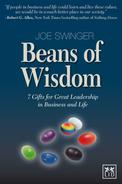12
Epilogue
Joe on beans of wisdom
It has now been several years since my incredible journey of discovery facilitated by the Beans of Wisdom. My boys grew up to become teenagers and young men that I have faith in to do great things in the world. It hasn’t always been easy but, as JJ said, they’re on their own paths now and they’ll each find and serve their unique purpose on their own particular timelines.
The wonderful thing about great memories is that they endure forever – I’ll always remember my boys as those two year olds who played in their sandbox, filled with wonder. I only hope that I can live up to their idea of what a great father is.
My wife and I reconciled and are now living the life of our dreams – experiencing and being present for each other in every precious moment. That’s all you need when you’ve married your soul mate – everything else in life is a bonus.
I’ve participated in a number of Beans of Wisdom Christmas Eve moments since becoming its director, and I’m continually humbled by their magic and power and the extraordinary people, both adults and children, that I meet.
Although it was a watershed moment in my life, the Beans were not so easy to implement at first. I’m not going to say that I came out of the event as a perfect leader – or man. We humans are flawed. Thus, change doesn’t occur immediately – and great change sometimes takes a long time.
The important thing to know is that you must take that first step and get onto your own path – as Dorothy did on the Yellow Brick Road in the “Wizard of Oz” – and believe that great things can happen once your transformation begins to take shape.
The butterfly doesn’t understand how its transformation will manifest; nature mandates that it enter its chrysalis stage – its protected growth and differentiation stage – so that its metamorphosis can take place. You, like the butterfly, must also enter your own chrysalis and trust that your true purpose will become manifest.
Leadership principles have come quite a long way since my extraordinary experience. It seems like every day I read about another leadership story on a blog or social media website. A brief internet search today identified several stories published over the last week, including some from notable authors.
Articles such as the “10 Traits of a Great Boss,” and “12 Attributes Every Great Leader Has,” make for great reading, especially when one notices that they have most of the qualities expressed in the piece. I read these articles myself, closely examining the characteristics to see whether or not I was determined to be a great leader – at least on that day until a new article comes out the next day.
The fact is that all of these articles are true to an extent. However, just because you have the traits doesn’t guarantee that you will be a great leader, or that if you don’t have them, that you would be a bad leader. These articles tend to compare the attributes they mention with the character of various great thought leaders of our time – and the paradox is that there may also be some terrible leaders who share these traits. In fact, thought leaders themselves are typically complex, extraordinary individuals who have manifested their life’s purpose on such a grand scale that it does them – and anyone else – a disservice to make such comparisons.
What’s important to realize is that human beings are complex, and someone we call a great leader today may have a composite of basic, critical, attributes – along with a few specialized attributes mixed in.
It would be the same principle if one were to investigate major-league baseball pitchers. There are many great pitchers in the League, past and present. Each pitcher must have the basic necessary skills – typically a wicked fastball – to make it to the League.
However, each pitcher usually has a few other incredible pitches, including their “go to” specialty pitch, in their repertoire. The same principle applies to leadership.
For me, the Beans of Wisdom opened my eyes to what essential human qualities a great leader must have to be successful in life. These essentials are crucial, just as good soil and nutrients are critical for a rose to develop strong roots and as a result, yield beautiful blooms.
Leaders lacking these basic human attributes can add whatever leadership qualities are currently in vogue, but there will always be an element missing from their end product. That element, in most cases, is authenticity.
I am sometimes told as I speak on the topic that the Beans appear “touchy-feely” and don’t really address leadership principles. In support of the Beans I always mention the associate engagement surveys that many companies administer to take the pulse of their workforce’s level of job satisfaction and, just as importantly, the effect of leadership on the work environment. I present the following composite survey questions for your understanding:
Does the work I do have meaning? (purpose)
Do I feel that my contributions make a difference? (love)Can I succeed without sacrificing aspects of my personality or culture? (tolerance)
Does this company care about its employees? (compassion)
Am I consistently challenged by my responsibilities? (forgiveness)
Do I continually have opportunities to learn new skills? (faith)
Do I know what is required of me to advance within the company? (perseverance)
It is clear that, while these articles make for great reading, what is measured by companies has very little to do with the traits one typically reads about.
I am also often asked how one goes about acquiring the attributes of the Beans if one doesn’t currently convey them. That’s a good question – and better answered by someone more qualified than me. For that reason, I’ve asked seven friends to say a few words about how they implemented the secrets and power of the Beans in the hope that it contributes to your understanding and the development of your own metamorphosis.
Let me leave you with this: the magic of the Beans – and a unique, authentic and fulfilling life – is available to everyone. No person or entity has a monopoly on life – nonetheless, you do have jurisdiction over your own life.
There’s a great proverb that says ‘the best way to predict one’s future is to create it.’ You’re an extraordinary individual – despite what you may currently think or feel. Become the main character in your own life story – don’t relegate yourself to taking a bit part or walk-on role.
Your answer is there – that voice inside you – as it has probably been for years.

Kris on purpose
I’ve been retired for several years now since my last Beans of Wisdom gathering when I turned the key over to my successor – and one of life’s great leaders, Joe.
Retirement is not all one reads about – both good and bad. There’s more time, of course, to do the things I always wanted to do. Unfortunately, many people often don’t know what they want to do – or what they desire doesn’t turn out to be or manifest their real purpose.
I’ve been able to spend more time with my family and those I love. I’ve seen my children grow to become great leaders in the world – while oftentimes stumbling along as humans often do. While the magic of the Beans is often talked about in regard to leadership, they also come in handy for moms or dads – or anyone else.
I still spend time lecturing around the world. It pains me to see that there are so many unhappy people everywhere today – yet it also gives me great joy that there are just as many who want to better the world but just don’t yet know how.
This is the greatest time in life for someone to do what they were put on this earth to do – to fulfill their purpose. Spreading your message – your voice – so that others can hear it around the globe has never been so achievable at any other time.
The power of the Beans lies in the fact that they are designed to work in harmony with one another. There is a logical order. It’s no accident that the Bean of Purpose is the first Bean because once you discover your true purpose, the world opens up to you – and life flows.
If you aren’t living your true purpose – if your occupation isn’t your true calling – or doesn’t in some way complement your true calling, you’ll never be at your best. How can you be a great leader when you have trouble leading yourself? You’ll always feel as if something’s missing and your sense of your own authenticity will always be a struggle.
It’s difficult to exhibit transcendent love towards others when you’re miserable in your job and in your life. Consequently, if you can’t exhibit authentic love, how can you ever offer true compassion and forgiveness to others?
The question I get asked most often is how a person can discover their true purpose – their destiny. There are so many mixed messages in today’s media that it’s very difficult to hear your inner voice among all the white noise. Sometimes it seems that this world is insane and that thousands of people – and entities – are competing for your attention.
It’s hard to know what to do or who to turn to. Many people tell me that they work jobs that they hate – just for the money – and that they’re afraid to leave those jobs to pursue their own dreams and purpose because of their obligations and responsibilities to their families.
There are others who experience an empty void in their lives and who innately believe that there must be more to living than what they’re currently doing, but they don’t know what – nor how – to discover what it is.
I always recommend that people searching for their purpose begin by separating themselves from the negative voices in their heads – and that disconnecting from the media onslaught that attempts to get inside it will help. Spending quality time with yourself isn’t a luxury, it’s a necessity. Traditional meditation can be an effective tool for doing this, though it may not appeal to everyone.
There are also many other non-traditional types of meditation that I’ve used quite effectively. People who have long drives to work can use that time to get in touch with their inner voices. Chances are good that many already do this, even though some might consider it as nothing more than idle thinking or navel gazing. However, you can convert this to productive thinking – and gentle music can be great for doing this because it’ll allow your mind to wander, and wandering thoughts can act as a net for catching ideas.
You can certainly use other methods. I still use my time on my treadmill or stationary bike as a catalyst for productive thinking. For me, the pairing of music through headphones and the resultant release of aerobic endorphins serve as a catalyst for generating some of my best thoughts and ideas.
Once you can silence some of the voices in your head, you might be surprised to actually hear your own inner voice – and this is when the fun begins. The good news is that there is a recipe of success for this, as Jerry would always point out.
I recommend finding a mentor or group of people with common interests to begin this process – you don’t have to feel alone in this. You may find that as you move forward in these pursuits, you might reap more benefit from changing mentors – the way you change teachers in school as you progress through your education.
Once you have a grasp of your true purpose – even if it takes months or years until you fully implement your vision – you might discover that mentoring others becomes easier. You might realize that your employees struggle with issues that you’ve already learned about, similar to the way an eighth grader can easily understand a fifth grader’s math studies and therefore, help them.
I often meet people who think they have to accomplish great feats or go halfway around the world to make some kind of difference in it. But the reality is that your greatest contribution could be to mentor others – right in your own backyard. This is why some of the best minds are in the teaching profession, despite what the media tells us.
I’ve met leaders who were afraid to mentor their subordinates for fear that those subordinates would leave the department or company. Not only is this shortsighted, from a business perspective, it’s also morally wrong. There’s no reason why you shouldn’t always give your best to everyone every day. You just may be the one who inspires someone who will be the one to solve one of society’s greatest challenges.
The most important thing to remember is that life is a journey. Don’t let time’s passing frighten you or lead you to believe that it’s too late to do what you’re here to do. One person may work at a company for 20 years before they become its CEO while another person may need 20 years of life experience to finally have the emotional capacity and depth to do what they’re here to do. We are all on different paths and timelines.
I look forward to the day our paths cross as we go along on our life journeys.

Monica on love
Love. It’s a word that’s taken on many meanings for me in the years since I first met Joe. It certainly feels to me as if there is less love in the world at this moment than at any other time in history. It’s as if global access to social media allows humanity to feed upon itself with every negative emotion available and that the more technological society becomes, the less humane it also becomes.
I’m still the manager of the same soup kitchen I worked at when I met Joe. Things have unfortunately gotten worse in the years since then. We’re at a terrible point in our society. Changes in customer demographics at the kitchen have been dramatic and what was once a place that helped a few unfortunate souls who had no one to care for them is now a necessary destination for entire families in order to survive.
You would think that Love is probably the easiest of the Beans to incorporate into your life. I mean, who hasn’t loved someone at some point in time? The Bean of Love actually represents more than what you’d consider typical love for another – it’s a transcendent type of love; a love of beings, if you will.
Sometimes when I’m out shopping or running errands, I sadly observe someone treating their pet with more love than they would a stranger they might interact with. And occasionally, it’s their children who receive less love.
People ask how you can go about incorporating this type of love. My answer is that love is about feelings. When you can feel good about yourself, you’ll typically feel good about others. This is much easier to do if you’re living your purpose.
It’s difficult to be a great leader if you’re in a job or occupation that feels wrong or not in alignment with your purpose. You’ll always experience internal conflicts that will eventually lead to external conflicts because it’s hard to keep those feelings hidden indefinitely. This profile fits the leader with poor engagement skills – the person that no one wants to work for. On the other hand, you flourish when you work in an occupation that you resonate with and love.
Loving another being means getting past their body and loving their soul – which you can access through your eyes. This is the great equalizer in life. How interesting this world would be if all we saw of each other were our eyes. Imagine if there were a huge screen blocking our views of each other’s bodies. All of the things that color our impressions of others would be removed. How would that make you feel?
Imagine being overweight but knowing that the extra pounds couldn’t be seen. How would that change your self-esteem? Or imagine yourself no longer being the wrong color when you go on a job interview. How would that affect your confidence? Or imagine if you had a disfigured face and when you met others, they couldn’t see it. This is why some people love the anonymity of the internet – they feel good knowing that they can’t be seen.
People who’ve experienced the Bean of Love view others as if there were a screen in front of them. There’s no body to color their views of them. My guests at the soup kitchen could be wearing evening tuxedos and I wouldn’t notice – because it’s their eyes that I see.

Singh on tolerance
Assessing an event or period in your life is difficult until you have the benefit of time and distance, which adds perspective. I believed the world was in a dangerous situation when I first met Joe on his journey, as he not-so-eloquently let me know. Now that several years have passed, I look back at that time, fondly, as the good old days.
The world seems to have become not just more dangerous, but also unhappier. The number of people who spew hatred and venom seems to increase each day. I believe part of this is due to the anonymity of the internet where one can sit behind a keyboard – or be on a cell phone – and blog or comment for spiteful ends using social media.
It makes sense that if a person engages in venomous behavior all day, they’ll assimilate that behavior into their personality, just as a person who is kind and caring, and who dedicates time to being helpful and generous towards others would naturally tend toward benevolent behavior.
Media today maintains a constant focus on polarizing politics and banal entertainment shows and profiles of celebrities. This continuous onslaught is mostly empty, the likes of which we’ve not seen before – but that we unfortunately and willingly embrace.
The Beans of Wisdom include the Bean of tolerance because it’s an integral ingredient in dealing with all other beings in the world. It’s not meant to embody so-called political correctness. People can say and do all ‘the right things,’ but I see the truth – and terror – in their eyes when, for example, I walk down the aisle of an airplane to my seat.
Tolerance is an attribute that truly great leaders share. It allows people to accept others’ opinions in the workplace and acknowledge that there may be differing views on every topic.
I’m often asked how someone can acquire tolerance or, at the very least, become more tolerant than they are. The answer is quite simple, just as it is for all of the Beans. Pay attention to what you do in every moment – if you tend to react rather than respond to changes around you. By being present in the moment, you’ll be more apt to acquire the desired behavior until it becomes instinctual.
I say it’s simple and, of course, recognizing your own behavior is the difficult part. You have to control your responses to your thoughts and quiet the negative voices in your head – including those that come from outside of you – from media overload. Once you can silence the madness, a completely different world that you never noticed before can become available.
I recommend starting small, with just you. People commonly think that problems regarding tolerance involve big issues, but smaller, daily kinds of issues also hinge on varying levels of tolerance or lack of tolerance. Pay attention to how much tolerance you’re able to muster as you drive in traffic or wait in a line – little things that drive you crazy, like when someone cuts in front of you – on the road or in a line – often have the effect of destroying your patience and with it, your ability to act with tolerance.
You might ask yourself how much tolerance you have with your co-workers’ idiosyncrasies and personality differences. Maybe, more importantly, you could ask yourself what kind of tolerance you have for yourself and for your own quirks or habits. Are you tolerant of your own failures and shortcomings or do you beat yourself up every time you eat fattening food and fall off your diet?
Once you can view the world from this perspective, so many more things are possible.

Lucas on forgiveness
My life’s taken quite a few turns since I met Joe that Christmas Eve some years ago. I moved out of town, so I no longer participate in the Beans of Wisdom, but it was a great experience for me while I participated. I still have affection for the days I spent in the white room! Since that time, I’ve learned that forgiveness is sometimes not as easy as I may have made it out to be that day.
The Bean of Forgiveness is about accepting responsibility for your own life, because each one of us creates what it is and where it can go. It was an easy concept for me to understand when I met Joe – since at that moment things were going well for me.
I’ve made my share of mistakes on the way to discovering that the world can be an unforgiving place for a young man covered in tattoos. As my friend Singh once pointed out, tolerance is in short supply in this world. After so much time of being treated like a criminal by so many people, it ended up becoming a self-fulfilling prophecy.
It unnerves me to speak about leadership since I don’t believe I’ve ever been a great leader in my life, although I still have faith that one day I’ll surprise my parents and make them proud.
I often speak to folks who are incarcerated on the topic of forgiveness and taking responsibility for your own life. At first, it was difficult because of the composition of the group, but then a strange thing began to happen. I noticed that the people on the inside were no different from the people on the outside – it’s just that they had four walls surrounding them that kept them in.
It is so easy to blame others for our downfalls and shortcomings, and I guess that’s why so many people do it. It took me a long time to accept responsibility for my own current situation, too – failure is never easy. Imagine my sticky situation of trying to convince people on the inside that they’re where they are because of some bad decisions they made. It’s a tough crowd, but I actually enjoy the challenge!
The more disturbing thing though, is that people on the outside live in their own types of prisons. They tend to accept mediocrity in their lives because they have to or they think they have to. For someone to be accountable for their own success in life, they also have to take responsibility for their failures, and that’s something many people just can’t overcome. It’s close to impossible to rise out of the ashes like the Phoenix when you’re filled with rage and negative energy. You almost feel like you have permission to fail.
People who really do want to change sometimes ask me how to go about cultivating forgiveness. Yes, I realize that there are professionals who address this sort of thing, and I even recommend them. But I also try to remember what I learned from Kris – that we have to forgive ourselves before we can begin forgiving others.
Great leaders know about the power of forgiveness because they’ve forgiven themselves many times for mistakes they made to finally get to where they are. Forgiving employees is powerful because it addresses the behavior and not the person. It’s like granting someone a do-over or a second chance – and we all need one of those once in awhile.

Emma on compassion
Things haven’t changed much for me over the last several years since I met Joe. I’m still a masseuse with a single massage table in one location, although a few times I’ve been offered the opportunity to open multiple locations. I’ve always turned down the offers because I don’t think of myself as a businesswoman, but instead, as a kind of spiritual medium who’s more concerned with transformation than money.
What I love about giving massages is the personal contact I make with my clients. I see what a massage does for a person – as Joe himself discovered in our initial meeting. It relieves the stress in their exhausted muscles, and even better, from their fatigued minds.
I still participate in the Beans of Wisdom event with Joe, but it’s not the same since some of the people I loved there moved on, though I still feel great joy when I see the smiles on the children’s faces. Once in awhile I get to meet up with one of the children after they’ve grown up. I treasure that!
We’re living during a challenging time in the world – true compassion seems rare these days. But how can we be surprised? So much communication is no longer face-to-face for the most part, but instead, through text messages and email. It’s hard to truly feel compassionate upon receiving important news by text message. Yet, that’s where we are.
The great thing about having compassion is that it allows you to be present in the moment, not only with one person, but with whatever situation is going on at the time. Maybe you’ve experienced this for yourself – watching a sunset or a sunrise that was so breathtaking that you couldn’t find the words to adequately describe it. You just watched it in silent awe and bathed in its beauty for those brief seconds, completely aware afterwards that you’d been part of something special.
These are the moments that begin to occur with more regularity as you eliminate the white noise in your head – kind of like the way you tune in on a radio frequency to hear something that catches your attention. Your focus becomes sharper and you’ll begin to notice things you hadn’t noticed before. You’ll notice that living takes on a certain depth that you’d only experienced on rare occasions.
Great leaders who demonstrate the Bean of Compassion do this almost entirely without realizing it since it just becomes part of who they are – their authenticity. These people are the leaders that everyone wants to work for – as if they have a certain charisma about them that’s magnetic.
It’s been shown that compassion is something that leaders can develop with dedicated practice. It just requires that you focus your mind and observe your actions and responses with resolution – and then perform a brief self-analysis afterward to check that your attention didn’t wander. Every interaction with an employee allows you the opportunity to assess your behavior and adjust it or change it as necessary, depending on the situation.
The analysis might seem awkward or unnatural at first, but after awhile you’ll reach a point where you don’t even have to think about it and it will just happen. Perhaps you’ve encountered a time when one of your associates wanted a day off for something important to them, but since you knew it was your busiest day you immediately just said ‘no’ without even considering it. How did that affect your associate’s morale? What if you said ‘yes’ or at least considered it the next time? Do you think you could find a way to make it work? Think about what that would mean to your associate – and to your team.

Jerry on faith
This is a very complicated time in the world for having faith. I thought it was difficult when I first met Boss, but now it feels as if everywhere I turn there’s cynicism and despair.
I think the world is still filled with hope, though – I mean, hope that someone will come along and fix our problems. Somehow I don’t believe that there’s a white knight or something out there in the world that’ll come along to save us. No, I’m pretty sure that it’s something that we – each one of us – will have to do for ourselves. Are you up to the task?
I’ve continued working with Joe since the first day we met. In fact, we’ve become good friends, getting together for good family times. It’s been great to watch his boys grow up and see his family thrive after coming from the situation they were in some years ago.
I want to make it clear that Joe’s latest success was wholly based on faith in his talents, his decisions and his team. He’s no longer a man who sits around hoping and waiting for success and good times to arrive – he works to make it happen.
Boss doesn’t just hope that his boys will grow into fine young men – he plants and cultivates his insights as if they were seeds of wisdom – and he explains the recipe for success to his boys. That makes it much easier for him to have faith that those seeds will yield strong roots.
The word ‘faith’ is often thrown around, especially in religious contexts. I never understood how a word such as faith could lead to the kinds of atrocities we see in the world today. It’s apparent that we’ve learned very little as a civilization.
That being said, the Bean of Faith is not about dogma, but instead, about your belief in yourself. I believe we’ve arrived at a point in time where personal transformation is rapidly taking place on a global level. I think that so many people feel a sort of divine discontent and therefore, they’re attempting to discover their true purpose in life – because they know there must be more. Can you feel it too?
Kris has spoken eloquently about how a person can discover their purpose and which steps to take to realize it. Faith is an integral part of that process. Sometimes faith is all we have to get us through the tough times.
This is something great leaders know about and experience on a daily basis. We sometimes forget that leaders must often make tough or unpopular decisions and have nothing to hang onto except for their belief in their decisions.
Critical thinking skills among employees are in short supply in this cookie-cutter business environment of ours today. This is one of the most important concepts that a leader can convey to his team. By teaching employees how to use and develop their critical thinking abilities – and have faith in their decisions – the leader builds capacity in the team and within each individual.
This is where a great leader excels – in having faith, not just in the decisions they make, but also in their associates’ decisions. I think this is why Joe is such a successful father – he trusts in his sons and the decisions they’ll make now and in the future.
Boss and I still get together occasionally to bake cupcakes for fun and to reminisce about when we first met. I still haven’t learned to like vanilla frosting.

JJ on perseverance
I haven’t seen much of Joe since that last day I met him, although I hear he’s done amazing things since taking over for Kris. I was offered a position to work with aspiring paralympians and there was no way I could pass it up. Getting an opportunity like this to help athletes realize their dreams after they believed they were destroyed was the perfect challenge for me.
The Bean of Perseverance is the last Bean we give because everything else has to be in place before it. Perseverance is the glue to your dreams. All your talent, passion and vision mean nothing – if you give up and stop trying. If you do that, you relegate your dream to the graveyard where you’ll find millions of other dreamers and the dreams they gave up on.
I won’t bore you with the names of famous and not-so-famous people who’ve made some of the greatest discoveries of the last century or so. Think about it –so many things we take for granted every day wouldn’t exist if they’d given up at some point in their journey.
The same can be said about many of the great businesses and products in the world today. Every technological device you use, everything you drive, everything you eat – all these things started as someone’s visionary idea.
I’m often asked ‘how much is enough’? When should I finally stop and give up and just resign myself to failure? But think about it – there’s no such thing as enough – because you never know where or when a breakthrough will occur. As long as you keep trying, you haven’t yet failed. How many times have you heard about someone getting his or her “big break”? That’s nothing more than perseverance – keeping at it and then having fortuitous circumstances reveal themselves.
The key to the big break is staying “in the game.” As long as you’re in, you’re open to the possibility of success. Sometimes you have to stay in the game through necessity while you gain the necessary wisdom to achieve your dream. It’s okay to be a “late bloomer” – some people don’t achieve their greatest success until they’re older.
And some work for years at a company or career before they become a top player. The same can be said for rising through the ranks of the military. How come that’s not seen as failure? Why would someone stay at a job or career for 10 or 20 years in order to progress at indeterminate intervals? Is that perseverance?
Once you have a vision of what you want to do, that’s when the negative voices that say you’re crazy and foolish begin. The negative chatter says ’you’re not good enough’ or ‘who do you think you are?’ Those are the same voices I heard when I trained for my Olympic medal. The voices said I was a long-shot medalist with two legs – so how on earth could I accomplish it with none?
The key will always be to listen to your inner voice. Sometimes the dream changes or atrophies and it’s time for a new dream. You’ll know when the time is right.

